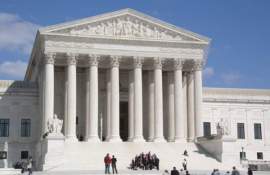
Florida Star v. B.J.F.

Florida Star v. B.J.F.
The 1989 Supreme Court case of Florida Star v. B.J.F. had its origins in a 1983 robbery and rape which occurred in Duval County, Florida. In October of that year, a woman reported this incident to the sheriff's office, which was then summarized in a report which used the full name of B.J.F. This report was then placed in the pressroom, on which no access restrictions had been placed. The report was then copied and reprinted nine days later in the "Florida Star," an inadvertent violation of that newspaper's internal policy of omitting the name of sexual assault rape victims.
B.J.F. subsequently filed a lawsuit against the "Florida Star" and the Sheriff's Department in the Circuit Court of Duval County. At the trial, which lasted a day, B.J.F. testified that her mother had received phone calls from an unidentified man who had read the article and threatened to rape B.J.F. again. She also testified that the publication of an article which was read by friends and co-workers had caused her emotional distress, and that she had been forced to move, obtain a new phone number, and necessitated both mental health counseling and police protection.
In its defense, the "Florida Star" stated that it had obtained the information of B.J.F.'s full name in a lawful fashion. However, the newspaper also had to defend itself against charges that it had violated a state law barring the publication of the name of a rape or sexual assault victim's name in anything qualifying as an "instrument of mass communication." The newspaper was unsuccessful in arguing that this law was unconstitutional, as the presiding judge found that this particular law did not violate the First Amendment, since it was limited to a specific, narrow set of circumstances. The case was then appealed to the Supreme Court.
In considering Florida Star v. B.J.F., the Supreme Court found that the failure to enforce this state law had begun with the sheriff's department. By publishing the full name of B.J.F., the Supreme Court ruled that the sheriff's department was itself in violation of this law. The majority opinion went on to note that press releases are a staple basis for news stories, and that the newspaper's addition of words to transform a crime report into language acceptable for a mass reading audience did not constitute a significant alteration of the report. The Supreme Court went on to reason that it would be unconstitutional to fine a newspaper for reprinting a government-issued press release made available to the press.
The Supreme Court went on to note there were easier and more constitutional ways to protect the rights of rape victims, such as placing the responsibility on police departments to keep their names private. The Supreme Court therefore ruled that the state law was unconstitutional and that the newspaper could not be made to pay damages.



















